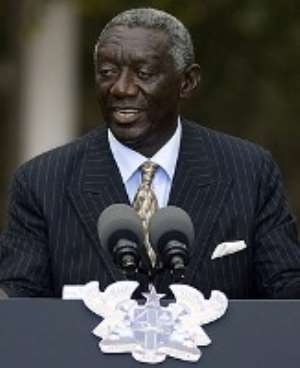
The President Mr J.A. Kufuor has cautioned the nation against rushing into electing district chief executives (DCEs), since the idea has the potential of being counter-productive.
Rather, he was of the opinion that the current system of appointing DCEs should be allowed to mature to the days when the nation could confidently adopt the new idea.
He said although the idea to elect DCEs had a great appeal, at the current level of development of the country when national unity, security and the fair distribution of the national cake must be central in governance, "the rushed implementation of this principle can prove counter-productive."
The President was addressing the closing session of the 2008 end-of-year review meeting for chief executives of metropolitan, municipal and district assemblies at the Institute of Local Government Studies at Madina in Accra yesterday.
The two-day meeting was intended to provide the participants with an opportunity to highlight the achievements and challenges in decentralisation and local governance over the past four years and fashion out strategies for the future.
At a recent debate organised by the Institute of Economic Affairs for the presidential candidates of the four major political parties in the country in Tamale, the four flag bearers of the parties agreed in principle that with time the position of DCE should be elective, rather than by appointment, as was being practised in some countries.
President Kufuor said the call for the mayoral local government system was consistent with the argument for the strict separation of powers in governance between the executive and the legislature at the local level, with reference to or an input from the central government.
He said the government had made great strides in the decentralisation process and commended the Ministry of Local Government, Rural Development and Environment, the district assemblies and all those who had made that possible.
President Kufuor said over the past eight years the government increased the number of district assemblies from 110 to 170 in an effort to bring decentralisation closer to the people and also involve them in decision-making.
He said the government also provided the necessary resources for the operations of the district assemblies, in9reasing the proportion of the national income allotted the District Assemblies Common Fund (DACF) from five to 7.5 per cent.
Additionally, he said, the necessary legislation was passed in 2003 for the establishment of the Local Government Service but conceded that the financial decentralisation was yet to be realised.
The President said the government had also sought to provide an enabling environment for the private sector and civil society to engage with district assemblies in development and mentioned the partnership between Zoomlion Ghana Limited and several assemblies as an example.
From the experiences of the government in the past eight years, President Kufuor said, local economic development and enhancing assemblies' capacities to take advantage of investment opportunities should be a major item on the agenda for the future.
That agenda, he explained, should include building the capacities of assemblies to take the initiative in exploring sources of capital and engaging in partnerships with private and civil society sectors.
The Minister of Local Government, Rural Development and Environment, Mr Kwadwo Adjei-Darko, underscored the need for assemblies to embark on campaigns to educate the people on the need for environmental sanitation and urged the DCEs to introduce sanitary inspectors to enhance sanitation in the communities.
He further asked them to put premium on local revenue generation to supplement the DACF in order to implement more development projects.
Mr Adjei-Darko said the crucial issue now was the forthcoming general election and asked the DCEs to make every effort to protect the integrity of the polls and the security of the people and the economy.




 Lay KPMG audit report on SML-GRA contract before Parliament – Isaac Adongo tells...
Lay KPMG audit report on SML-GRA contract before Parliament – Isaac Adongo tells...
 Supervisor remanded for stabbing businessman with broken bottle and screwdriver
Supervisor remanded for stabbing businessman with broken bottle and screwdriver
 NDC watching EC and NPP closely on Returning Officer recruitment — Omane Boamah
NDC watching EC and NPP closely on Returning Officer recruitment — Omane Boamah
 Your decision to contest for president again is pathetic – Annoh-Dompreh blasts ...
Your decision to contest for president again is pathetic – Annoh-Dompreh blasts ...
 Election 2024: Security agencies ready to keep peace and secure the country — IG...
Election 2024: Security agencies ready to keep peace and secure the country — IG...
 People no longer place value in public basic schools; new uniforms, painting wil...
People no longer place value in public basic schools; new uniforms, painting wil...
 'Comedian' Paul Adom Otchere needs help – Sulemana Braimah
'Comedian' Paul Adom Otchere needs help – Sulemana Braimah
 Ejisu by-election: Only 33% of voters can be swayed by inducement — Global InfoA...
Ejisu by-election: Only 33% of voters can be swayed by inducement — Global InfoA...
 Minority will expose the beneficial owners of SML, recover funds paid to company...
Minority will expose the beneficial owners of SML, recover funds paid to company...
 Prof. Opoku-Agyemang has ‘decapitated’ the NPP’s strategies; don’t take them ser...
Prof. Opoku-Agyemang has ‘decapitated’ the NPP’s strategies; don’t take them ser...
